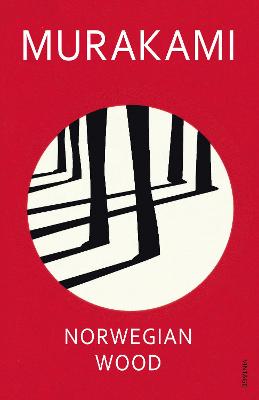
*PRE-ORDER HARUKI MURAKAMI’S NEW NOVEL, THE CITY AND ITS UNCERTAIN WALLS, NOW*
'A masterly novel' New York Times
'Such is the exquisite, gossamer construction of Murakami's writing that everything he chooses to describe trembles with symbolic possibility' Guardian
Read the haunting love story that turned Murakami into a literary superstar.
When he hears her favourite Beatles song, Toru Watanabe recalls his first love Naoko, the girlfriend of his best friend Kizuki. Immediately he is transported back almost twenty years to his student days in Tokyo, adrift in a world of uneasy friendships, casual sex, passion, loss and desire - to a time when an impetuous young woman called Midori marches into his life and he has to choose between the future and the past.
'Evocative, entertaining, sexy and funny; but then Murakami is one of the best writers around' Time Out
'Poignant, romantic and hopeless, it beautifully encapsulates the heartbreak and loss of faith' Sunday Times
'This book is undeniably hip, full of student uprisings, free love, booze and 1960s pop, it's also genuinely emotionally engaging, and describes the highs of adolescence as well as the lows' Independent on Sunday
- ISBN10 0099448823
- ISBN13 9780099448822
- Publish Date 17 May 2001 (first published 1 January 1999)
- Publish Status Active
- Out of Print 27 September 2023
- Publish Country GB
- Imprint Vintage
- Format Paperback (B-Format (198x129 mm))
- Pages 400
- Language English
Reviews


sokodomo
If I want to read a japanese author's book about a man's misery, all the women and shitty people he met in his life told in first person ever again, I'd rather reread No Longer Human by Osamu Dazai. At least that book evoked some kind of emotion in me.
I listened to the audiobook version, narrated by James Yaegashi, and I recommend it. I chose it because I don't like hearing names getting butchered, but his performance was very pleasant overall. If it weren't for him I might have not finished this book at all.

maggiefan
The main things that bother me in this book are:
1. FREAKING SEX ON EVERY SINGLE PAGE. I don't mind sex in books at all, don't get me wrong. But there are TOO MANY sex scenes. And the main problem with this is that love is sex and sex is love in this book. This fact makes me so angry that I just can't...
2. Every single character in the book was flat. The main character was super boring. All he did was whining about Naoko and how he was such a bad person for using girls and also saying "yeah, I guess", "hmmm", "I don't know", "sure", "I understand". I screamed every single time he said something. Naoko was just a stupid girl who could not say no to a man. "Yeah, I don't love you, but if you want some blowjob, I'll do it ;)". Midori... Oh god, where should I start... She was so selfish and capricious. She knew from the start that Watanabe had a girlfriend (kinda), but she was so possessive towards him. She thought only about sex. I just could not stand her. I can't say much about Reiko. Can I just remind you of the last scene in the book? Should I add anything? I think no.
3. There is no plot. At all. You can ask: "How is this possible?" I can't answer this question. The author somehow managed to write a book without a plot and it frustrated me so much.

Bianca
“So I made up my mind I was going to find someone who would love me unconditionally 365 days a year. I was still in primary school at the time, but I made up my mind once and for all."
"Wow. And did your search pay off?"
"That's the hard part. I guess I've been waiting so long I'm looking for perfection. That makes it tough."
"Waiting for the perfect love?"
"No, even I know better than that. I'm looking for selfishness. Perfect selfishness. Like, say I tell you I want to eat strawberry shortbread. And you stop everything you're doing and run out and buy it for me. And you come back out of breath and get down on your knees and hold this strawberry shortbread out to me. And I say I don't want it any more and throw it out of the window. That's what I 'm looking for."
"I'm not sure that has anything to do with love."
“It does. You just don't know it. There are times in a girl's life when things like that are incredibly important."
"Things like throwing strawberry shortbread out of the window?"
"Exactly. And when I do it, I want the man to apologize to me. 'Now I see, Midori. What a fool I've been! I should have known that you would lose your desire for strawberry shortbread. I have all the intelligence and sensitivity of a piece of donkey shit. To make it up to you, I'll go out and buy you something else. What would you like? Chocolate mousse? Cheesecake?'"
"So then what?"
"So then I'd give him all the love he deserves for what he's done."
"Sounds crazy to me."
"Well, to me, that's what love is. Not that anyone can understand me, though. For a certain kind of person, love begins from something tiny or silly. From something like that or it doesn't begin at all.”

chrssym
Didn't love the ending, but really enjoyed it overall. I want to give some more Murakami books a go soon!

Michael @ Knowledge Lost
Norwegian Wood is often referred to as the best starting point when diving into the works of Haruki Murakami, mainly because this is one of the few books that don’t have a magical realism thread to it. This is a good place to start but what I find fascinating is the way Murakami uses magical realism to explore ideas of the mind. Colorless Tsukuru Tazaki and His Years of Pilgrimage and Norwegian Wood don’t have that same fantastical style but they still follow similar themes. Colorless Tsukuru Tazaki looks at the psychological impacts of losing friendships, while this novel looks at ideas of memory. From what I have read so far, Murakami’s other books do similar things but the use of magical realism allows him to dive into the mind and explore it as a fantastical world.
I have heard Norwegian Wood described as a coming of age story so many times, but I find it difficult to classify this book as such; for the simple fact that Toru Watanabe is 37 years on at the start of the novel, even though the majority of the novel is set during his college years. I think this is more a reflection on life and love, a novel that explores ideas of memory and nostalgia through themes like loss, depression and sexuality. This leads me to wonder just how reliable Watanabe really is and if there is a ‘rose coloured glasses’ perception happening in the novel. However the way this novel comes together and deals with memory (especially at the end) works so well and I can understand why Norwegian Wood is a Haruki Murakami favourite for many people.
One thing that really stuck with me with Norwegian Wood is the way Murakami developed characters. I found most characters to be complex and well rounded, they all had a unique personality and it was such a joy to read something with such great character development. A favourite of mine was Midori, who reminds me a lot of my wife; a confident and sure character who is at times insecure but has a great interest in talking about sex with others. She was the highlight of the whole novel and I always looked forward to her turning up within the story.
Before I knew who Haruki Murakami was, I saw the 2010 Japanese movie adaptation and thankfully I forgot most of the story. While images and plot points did come back to me as I read the novel, I was glad I didn’t have that outside influence but now I do need to re-watch the movie. Norwegian Wood is a great starting place if you have never read Haruki Murakami before. Apparently Murakami isn’t too happy that this is the novel that people will read or recognise him by, but it really is one of his stand out books. I have so many more Murakami books to read and I am really looking forward to diving into them all.
This review originally appeared on my blog; http://literary-exploration.com/2015/03/08/norwegian-wood-by-haruki-murakami/

Jyc

empressbrooke
I also felt like even though it was translated to English, I was missing so much regarding the culture. I kept wondering, "Why are all these people committing suicide? Why are all these people having breakdowns and hiding away in asylums?" I've often been aware that I'm reading about a different culture from my own when reading Murakami, but this time I definitely felt like things were going right over my head. Not any fault of the author's, of course, and in these cases I'm usually inspired to do a little research and gain a better understanding, but Norwegian Wood just left me ready to move on.
